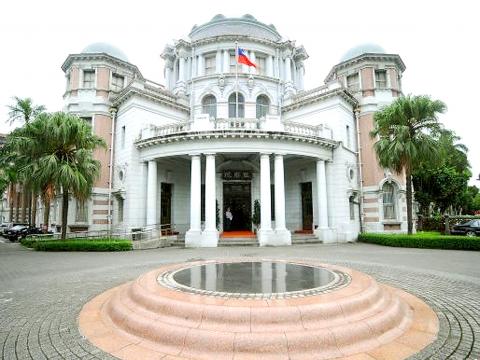A national Human Rights Committee and the legal amendments needed for it to operate were yesterday approved by the Control Yuan.
They are to be reviewed by the Legislative Yuan.
Control Yuan Secretary-General Fu Meng-jung (傅孟融) said that the committee would have three main goals — research and planning, including drafting suggestions, pushing for legislation of important international accords on human rights and the drafting of important human rights reports; interviews and investigations of actions that violate or discriminate against the human rights of others; and educational interaction with other human rights organizations or nations.

Photo: Taipei Times
The Control Yuan on May 13 concluded its deliberations and approved a national human rights committee organic act alongside ancillary measures, an amendment to the Organic Act of the Control Yuan (監察院組織法) and an amendment to the organic acts for the Control Yuan’s subordinate committees.
All three were voted on and approved by the Control Yuan yesterday, Fu said.
The committee would have between 32 and 45 staff, with the Control Yuan president and vice president serving as committee chairman and deputy chairman, while other Control Yuan members would also serve as members of the committee, he said.
Citing figures from an assessment of international human rights institutions conducted by the Global Alliance of National Human Rights Institutions, Fu said that 80 nations have institutions in the form of a human rights committee and another 48 have the institution in the form of an ombudsman.
As the nation’s highest ombudsman, the Control Yuan has since 1994 been a member of the Austria-based International Ombudsman Institute, he added.
Three human rights experts visited Taiwan in 2017, including former New Zealand human rights commissioner Rosslyn Noonan, and suggested that Taiwan should establish a human rights committee as part of the Control Yuan.
The experts also suggested that legal amendments could, while preserving the form of the Control Yuan, introduce legal responsibilities for it to oversee human rights protection so that Taiwan would become a nation in compliance with the Paris Principles.
The Paris Principles, adopted by the UN General Assembly in 1993, are related to national institutions that protect and promote human rights.
The establishment of a human rights committee would help the Control Yuan become a governmental institution that promotes human rights, Fu said, adding that this would help Taiwan connect internationally on human rights development.
Should the act and amendments be passed by the Legislative Yuan, the committee would promote Taiwan’s image as a nation that safeguards human rights, Fu said.

A magnitude 6.4 earthquake struck off the coast of Hualien County in eastern Taiwan at 7pm yesterday, the Central Weather Administration (CWA) said. The epicenter of the temblor was at sea, about 69.9km south of Hualien County Hall, at a depth of 30.9km, it said. There were no immediate reports of damage resulting from the quake. The earthquake’s intensity, which gauges the actual effect of a temblor, was highest in Taitung County’s Changbin Township (長濱), where it measured 5 on Taiwan’s seven-tier intensity scale. The quake also measured an intensity of 4 in Hualien, Nantou, Chiayi, Yunlin, Changhua and Miaoli counties, as well as

Taiwan is to have nine extended holidays next year, led by a nine-day Lunar New Year break, the Cabinet announced yesterday. The nine-day Lunar New Year holiday next year matches the length of this year’s holiday, which featured six extended holidays. The increase in extended holidays is due to the Act on the Implementation of Commemorative and Festival Holidays (紀念日及節日實施條例), which was passed early last month with support from the opposition Chinese Nationalist Party (KMT) and Taiwan People’s Party. Under the new act, the day before Lunar New Year’s Eve is also a national holiday, and Labor Day would no longer be limited

COMMITMENTS: The company had a relatively low renewable ratio at 56 percent and did not have any goal to achieve 100 percent renewable energy, the report said Pegatron Corp ranked the lowest among five major final assembly suppliers in progressing toward Apple Inc’s commitment to be 100 percent carbon neutral by 2030, a Greenpeace East Asia report said yesterday. While Apple has set the goal of using 100 percent renewable energy across its entire business, supply chain and product lifecycle by 2030, carbon emissions from electronics manufacturing are rising globally due to increased energy consumption, it said. Given that carbon emissions from its supply chain accounted for more than half of its total emissions last year, Greenpeace East Asia evaluated the green transition performance of Apple’s five largest final

Taiwan is to extend its visa-waiver program for Philippine passport holders for another year, starting on Aug. 1, Minister of Foreign Affairs Lin Chia-lung (林佳龍) said on Friday. Lin made the announcement during a reception in Taipei marking the 127th anniversary of Philippine independence and the 50th anniversary of the establishment of the Manila Economic and Cultural Office (MECO) in Taiwan, the Ministry of Foreign Affairs said. The decision reflected Taiwan’s commitment to deepening exchanges with the Philippines, the statement cited Lin as saying, adding that it was a key partner under the New Southbound Policy launched in 2016. Lin also expressed hope